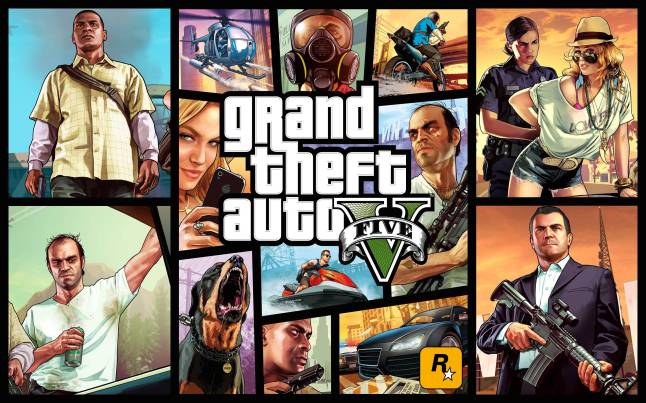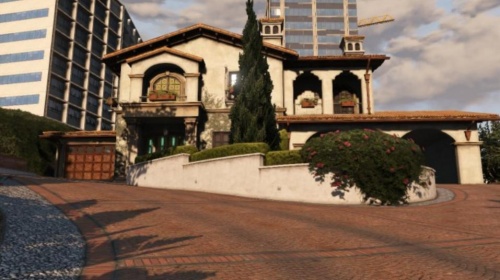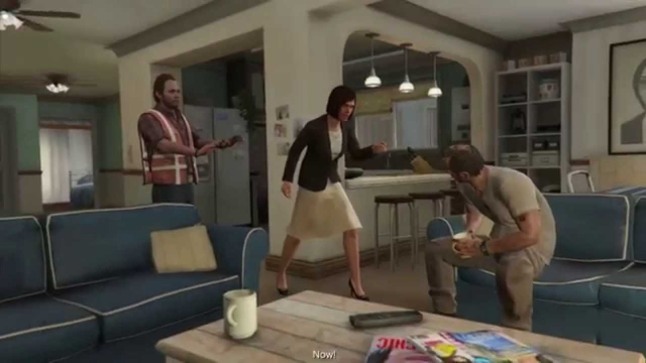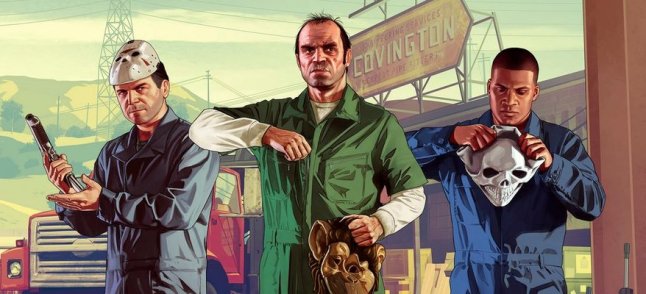
Rockstar’s latest addition to its family of crime simulation video games.
Grand Theft Auto 5, a satirical representation of everything our society was, is, and will continue to be. The game began to make its mark on pop-culture late 2013, but I didn’t get to grasp what the game truly meant because PC users, like me, could not get their hands on it until mid 2015. Immediately after purchasing it I was astonished to discover that the game was three times the memory size of even the newest games on the market. After the download completed I soon came to realize that GTA5 was more than just another crime simulation video game.
Along with all the components that create a “good” video game, Rockstar Games created something more: a satirical mockery of society as we know it. Is the game grotesquely dark and disturbing? Yes, but so is society. As you play the game, you are constantly reminded of how GTA5 makes fun of the world we live in. Putting the devil in the details is just how Rockstar points at you and screams, “This is how fucked up your society is,” and they are right. The game refuses to cut corners in its imitation of our social experience; advertisements and radio dialogue, reality shows and sports, clothes and cars, reactions and interactions are heavily incorporated during your time within the city and surrounding area of Los Santos (analogous to Los Angeles).
At first I was amazed by the level at which detail appeared in this simulation of social life. During a ‘stakeout mission’ I found a Cola truck (Rockstars Coke replacement) to follow my target. While trying to find a contact in my in-game phone, I got distracted and started to play a game on the in-game internet. I even got side-tracked trying to beat a triathlete at a race. Then I started to listen and watch; picking up on the even finer details, I realized that GTA5 touched on some of the greater social issues of our time (most of which people are too afraid to acknowledge). Through the lenses of three unique characters, woven into a grander narrative, I was granted the ability to at least witness the simulation of age, gender, race, and social class in our society through different perspectives. Are these portrayals politically correct? No, but they show you the dark gritty truth behind a satirical mask. Although the face value of GTA5 is only a crime simulation, underneath the skin it is an absurdly accurate representation of our society’s terrifying nature. To do this, the game makes us step into the shoes of three unique characters.
The Cast of Grand Theft Auto V

Franklin uses his repossession job as a way to legitimize getting out of the ‘hood’.
Meet Franklin Clinton, a 25 year-old, african-american male, lower-middle class, and repo-agent/gang banger. With one goal in mind, Franklin will do anything to get himself out of the hood. Franklin has realized that the gang-banging days are long behind him, hence the repossession job, and so he is searching for a way to make his way in the world. While money does not seem to be an issue, the house that he shares with his aunt, Denise, is in the middle of a poor neighborhood. The repossession job seems to keep Franklin financially afloat, but his economic progress is stagnant. Franklin meets Michael De Santa, after a failed repossession of Jimmy De Santa’s car, and instead of reprimanding Franklin, Michael decides to take the kid under his wing. Thus begins the complicated relationship between an ex-gang banger and an ex-bank robber; one is trying to escape the hood and one is trying to escape his family. However, GTA, satirically mirroring the racial stigmas of real life, portrays Franklin’s existence as a permanent struggle to reap the rewards he has earned. His success does not seem to get him anywhere, and no matter how hard he works, he risks getting screwed over. The people he surrounds himself with, such as his Lamar Davis and his repo-employer Simeon Yetarian, are all struggling with the same thing. Lamar, stagnant in his gang-banging ways, is just making his way in the world, but is confused how Franklin is going to get out of the hood if he turns away from his old life. Simeon, a somewhat cut-throat car-dealer, seems to be successful, but he is always going on about how he needs to protect his investments. It seems that the individuals surrounding Franklin cannot escape the lower class system of financial oppression. Further along in the narrative, even when Franklin seems to be on the brink of achieving his goal, a corporate business man, Devin Weston, recruits Franklin to boost a set of expensive cars. This task is alarmingly similar to his repo-job; Franklin is heard complaining about the two job’s similarities. It seems that the city of Los Santos is against Franklin, but is this a coincidence or a conniving way Rockstar shows us the life of inner city society?

Franklin with fellow gang-bangers, Lamar and Stretch.
The other protagonists in GTA5 are white, but Franklin offers us the far more interesting perspective of a black male trying to make it in a white world. This is not a new perspective for Rockstar to portray; however, it has never been put side by side with the white perspective that is often presented to us through the media. Franklin is a skeptical character, often reluctant to take on jobs and be apart of his friends’ schemes; Michael, society’s white upper-class representation, seems to be the only person Franklin puts trusts into. Lamar and Denise accuse Franklin of neglecting the “families”, or the hood community, after he starts to work with Michael to escape poverty. To Franklin, the world is against him, and for the most part he is right because he gets screwed over by friend and foe alike. Lamar constantly recruits Franklin for jobs that go bad, and their acquaintance, Harold “Stretch” Joseph, knowingly leads the two friends into unwanted danger. Franklin is not only oppressed within the GTA5 narrative, but also within the game play itself. The “Franklin Conspiracy” is a subtle phenomenon that occurs if the player chooses to roam the streets of Los Santos as Franklin. While it is normal for police to respond to criminal behavior in-game, it is quite strange when the police force responds more aggressively toward the black protagonist. In some instances the police will try to arrest you for merely interacting with them. Rockstar studios denied the inclusion of racist cops in the game, but both anecdotal and statistical accounts have shown that the in-game cops respond according to the area the characters find themselves in. Whether this is an accidental mistake or a purposeful representation of real life statistics, GTA5 demonstrates police profiling of not only minorities, but also the impoverished.

Franklin helps Beverly expose celebrities’ dark secrets to the masses.
Franklin’s experience is somewhat preoccupied with representing the black male stereotype, but there is still more than enough room for the misogynistic issues of our society. Throughout the narrative, Franklin struggles to maintain, or even avoid, a few relationships with female characters. His ex-girlfriend, Tanisha, embodies someone who has found a way out of the criminality of the hood; she is in the process of marrying a doctor. Additionally, Denise, his aunt that shares a ‘safe house’ with him, hates Franklin, banning him from the house when she is partaking in any of her spiritual activities. Often found partaking in spiritual walks and chants, Denise identifies herself as a ‘new-age-feminist’ and surrounds herself with female friends that spiritually embrace their female sexuality. The two characters represent very different stereotypes, but they belong to the same social class demographic. This scenario is quite confusing because Denise’s lifestyles are somewhat parallel to those of Amanda De Santa, an upper-class white woman. The in-game universe is obviously using Denise to satirically represent a certain stereotype, but Franklin more or less disregards her as an annoying object to deal with. Here is where it gets interesting, Franklin happens upon a man named Beverly Felton whose primary occupation is exposing celebrities. For whatever reason (most likely cash) Franklin decides to help Beverly with his quest to obtain and publish stories, with an exaggerated quality, relatable to what we see on the cover of People magazine. However, these “missions” predominantly target female celebrities undergoing idiotic or sexual behaviors; parallels can be drawn from real world celebrity drama on TV and magazines and the in-game missions Franklin is participating in.

Michael practically lives in a Rockstar’s version of Hollywood.
Meet Michael De Santa (formerly Michael Townley), a 45 year-old white male, upper class, ex-bank robber extraordinaire. With a dark past behind him, Michael is under witness protection by the FIB (you guessed it, Rockstar’s play on the FBI) which involved faking his own death. That aside, he is an upper class citizen with the property, house, and cars to prove it. However, GTA5 decides to contrast the glamour with the dysfunctional family of his spouse Amanda, his teenage son Jimmy, and his teenage daughter Tracey. Amanda cheats on him, Jimmy spends his days playing video games and smoking weed, and Tracey will do anything, sexual favors included, to become famous. Naturally, Michael, missing the thrill of crime, is pushed back into his former occupation. The narrative is clearly outlined through a subtle pop-culture reference: the therapist that Michael meets to cope with his life. Ironically, as Michael releases his feelings, his therapist deflects questions with reminders about rates, seemingly uninterested with his patient. Thus, Michael satirically portrays the quintessential upper class white male, excluding the whole criminal mastermind part.

White privilege is reflected through Michael’s wealth and property
Race is a mediated substance of our society, prevalent in everyone’s everyday life. Michael’s lack of interaction with race is incredibly unnerving, especially when compared to the other character’s experiences. Aside from interacting with his partner in training and destroying a mexican cartel boss’ house, Michael has the privilege not to interact with many minorities. Why? Well, because Michael’s racial and socio-economic standing allows him to. An upper class white male is among the upper echelon of society, therefore, he has the money and social standing to propagate the idea that other races belong to lower echelons of society. Does Michael actively support this subtly racist lifestyle? No, but by being a benefiting bystander he is supporting the fundamentally racist attitude of the white upper-class. Upon closer inspection, all of the racially diverse characters that are financially successful in Los Santos have made their money through illicit means. An accidental coincidence, or a calculated imitation of popular perception of minorities? I am going to assume that Rockstar was well aware of pop-culture’s perception of the relationship between race and money.

Amanda’s yoga classes are somewhat harmless, but can become quite sexual.
Michael’s interaction with race seems somewhat limited, but his various family members produce more than enough interactions with society’s stereotypical image of women. Michael’s wife and daughter both portray characters that take on a very sexual role in the world around them. Amanda had to leave her stripping and prostitution career behind when Michael went into witness protection. In response to Michael forcing her to leave her old life, she resents him and surrounds herself with hypersexualized male “trainers” (she is found cheating on Michael with her tennis instructor). The relationship between the two adults feeds into the kids lives. Tracey, Michael’s daughter, is obsessed with becoming famous. Her main scheme to achieve such a status is through the reality television show Fame or Shame (Similar to America’s Got Talent). It seems innocent, but as the narrative plays out, Tracey finds herself in the hands of sexually exploitative situations to reach her goal. The female characters around Michael often have shallow single tracked personalities. Michael does not support the sexual objectification of his family members, but the world of GTA draws upon these stereotypes, reminding us how the media portrays women. The surrounding areas of Los Santos are ripe with these satirical representations of how society views women. Now of course these exaggerated representations are misogynistic and sexist, but if you take a step outside of the game, many parallels can be drawn from the real world. Once again, this is Rockstar’s world, but Rockstar chose to model it after our world.

Unlike Michael, Trevor never turned away from a life of crime and violence.
Meet Trevor Phillips, a 40ish year-old, white lower class male, ex-bank robber and CEO of Trevor Phillips Enterprises (a drug smuggling operation, and no, not the clever kind like in Breaking Bad). With a psychotic and unpredictable behavior, Trevor gives the game a perspective like no other. He was on the path to becoming a military pilot, but was judged as ‘mentally unfit’ and discharged accordingly. Now, with the bank robbing days behind him, he resides in the dirt poor redneck town of Sandy Shores (outside of Los Santos), running a small, but very aggressive drug operation. Trevor enters the narrative at a somewhat late stage, but when he enters Rockstar ups the ante of GTA from absurdly offensive, to terrifyingly disgusting. Trevor breaks down any political correctness still left in GTA. He is racist, misogynistic, violent, and worst of all manipulative. His “friends”, that he manipulates to achieve his goal of money and power, are Ron Jakowski, Wade and Floyd Hebert. All three of Trevor’s “friends” are manipulated by fear and violence to help him expand his “company”. Cracking disgusting and absurd jokes, Trevor is not afraid of the authorities, death, or any obstacle standing between him and power. By far, he is one of the most controversial portrayals of white trash hillbillies present in the media.

Trevor’s involvement with the Civic Border Patrol is brief but dangerous for any nearby minorities.
There are few words that can describe Trevor’s abhorrent racism, but perhaps Rockstar designed his personality with non-relatability in mind. Throughout the narrative and Trevor’s personal experiences, we witness the racist mind of a psychotically violent redneck. He constantly refers to minorities as lesser than himself, all the while using them to help flourish TP Enterprises. This is to be expected from a character like this, but not all his racism turns to violence. When Trevor finally steps into the narrative alongside his two other partners, he meets Franklin, whom he tries to befriend because he is jealous of Michael’s relationship with the kid. As I said before, Trevor is manipulative, but when it comes to social interaction, he culturally appropriates himself with Franklin’s “black” life-styles. This interaction is done with little more than small sound bites conversation, but naturally, Franklin does not respond with arms wide open to accept Trevor’s attempt at friendship. The other interesting run-in Trevor has with his good buddy racism is his participation in the ‘Civil Border Patrol’ (A neighborhood watch for anyone that hates immigrants). Joe and Josef (the latter being and speaking Russian) ask Trevor to help them keep ‘America free of “illegal” immigrants’. Naturally, Trevor accepts and a string of ‘run-down and detain missions’ ensues, despite his semi-Canadian nationality. Here is the catch, Trevor (and the player guiding him) never sees what happens to these “illegal” immigrants; later on during this miniature story arc Trevor encounters one of the detained “immigrants”. The “immigrant’s” family turns out to have been in America for over 200 years. Outraged, our psychotic white trash redneck tracks down and kills Joe and Josef. Despite being a stone-cold psychotic killer, Trevor still has a little room in his heart for right and wrong, too bad he does not use this intuition where it counts.

Trevor has no respect for successful women with high authority.
Michael’s character has been focused on gender, while Franklin’s on race, but now we see how Trevor represents both sides of what society has to offer. Still incredibly racist, Trevor is also an incredibly disgusting misogynist and sexist, treating women like objects that he can toy with. The first scene that reintroduces our beloved redneck, is a feud between Trevor and another man over a woman. Both parties refer to the woman as theirs, objectifying her existence, but more disturbingly Trevor decides to kill the man and leave the woman to mourn over him. With no regard to humanity, Trevor encounters Wade’s cousin, Floyd, who has found himself in a relationship with an ultra-controlling girlfriend named Debra. During most of the narrative Debra is away for work, but Floyd is left alone with their house and Trevor’s influence. While Trevor is decisively using Floyd’s connections to increase TP Enterprises fortune, he is also convincing Floyd that Debra’s influence is degrading his manhood. Debra fits the bill as a stereotypical successful business woman, and we get to see just how much of a control fanatic she is when she returns to find that Trevor has ransacked her home. Trevor is not only objectifying and degrading about the way he sees people, he is also outspoken and quite blatant about his under-educated redneck opinions. Although mostly every situation with Trevor exemplifies the latter, it is especially clear when he expresses his sexual appeal for Molly Schultz, vice president of Devin Weston Holdings. Molly is partner to Devin Weston, CEO executive with extra-legal abilities, and is a very powerful character. Like most powerful female characters, Molly lacks some feminine behavior, which directly conflicts with Trevor’s view of her as a sexual object. While Molly rejects his sexual advances, Trevor’s actions speak louder than words for how this miniature scenario reflects the broader subject of our patriarchal society. It seems Rockstar has modeled Trevor’s character after the worst of the worst society has to offer on the subject of race and gender.
What does this mean?

Satirical awareness campaign or Rockstars exploitation of society’s power complex and feedback loop?
Grand Theft Auto 5 has received critical acclaim and debasement for being an excellent game and an unacceptable politically incorrect message. The issue is that both parties are ignoring Rockstars success in creating a satirical representation of society (more specifically of Californian culture). Among all GTA5’s controversies, there are parallels that can be drawn between the game’s portrayal of our world and the actual behavior of our society. The game does this through exaggerated satirical content that has the potential to raise awareness through being offensive and insensitive to everyone (similar to the content of shows like South Park). However, has Rockstar Games gone too far? When does a satirical representation cease to stand out, becoming part of society’s feedback loop? With over 200 million copies sold, I struggle with being comfortable that the people owning the game realize the issues it raises. A quick surf of the web confirms my suspicions; people do not take GTA5 for more than its face value. Its fans defend it as just another game for older audiences, but others fight back saying its racist, sexist and more. Both of these shallow interpretations hold truth, but the reality of it is that the Rockstar has made the game into something worthy of deeper criticism.
Rockstar Games has created a masterpiece of satirical content mocking our society. Not only have they channeled it through a specific form of entertainment (video games), they have been incredibly successful at selling it. The question is why? Why do the people buy a product that makes fun of them? If there is anything that should be gathered from the game, it is that we should look closer at our society. However, this is not the reality. The reality is that while Rockstar has created a masterful piece of satirical entertainment, it also feeds on consumerism. GTA5 allows the player to experience the monstrosity of societal effects, but it also grants them the power to ignore the consequences, the messages, and the awareness of such a society. While Rockstar is just trying to sell its game, consequently, the world of GTA does not force the player to think about the implications of Los Santos, let alone the player’sreality. GTA5 will point its finger and laugh at the world we live in, urging you to do the same, but it offers no more than that. The consequence of this is that the satirical representations in the game are projected onto real life and added into a satirical feedback loop.
The purpose of a satirical representation, a spoof on society, is to look at the issues, controversies, and imperfections that occur with our daily lives. Upon closer inspection, the parallels we can draw between the world we live in and the simulated experience of GTA is frightening to say the least. It is no wonder that people react negatively to a source of entertainment that satirically commentates the social experience. It is not the purposeful representation of sexism, racism, and classism that we should worry about. We should be worried about the truth that the representation carries with it. The lack of people that respond with this realization is the reason that politically incorrect messages get inserted into the societal feedback loop. Grand Theft Auto 5 is just another video game to some, or the culmination of societal bigotry to others, but the overall extracted message should be much more. While the franchise must keep the name of Grand Theft Auto to sell its copies, Rockstar has stolen more than just a car from society. They have committed Grand Theft Pop-culture.
